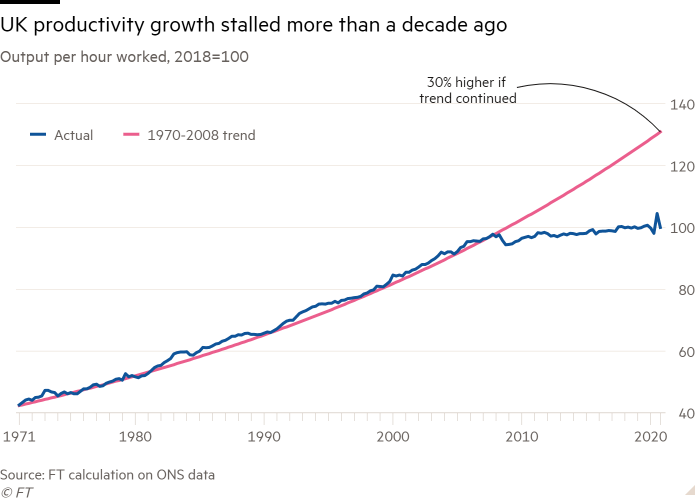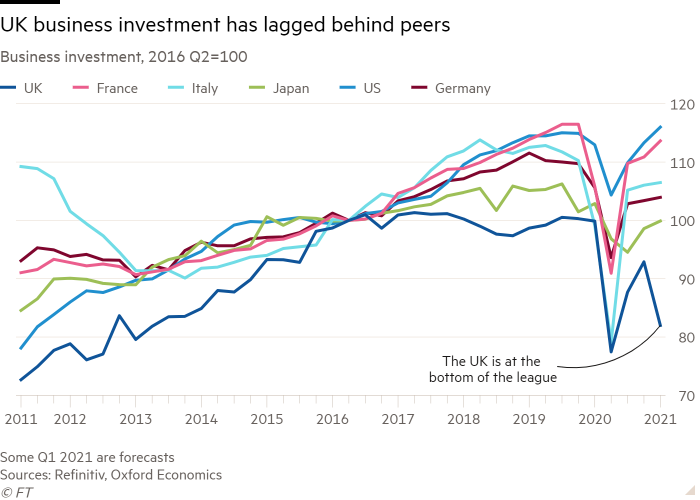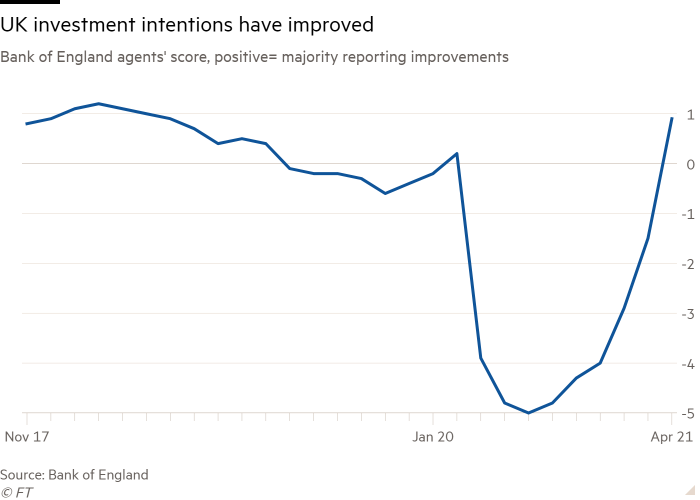[ad_1]
The shift to homeworking, online consumption and social distancing during the Covid-19 pandemic has driven increased investment in new technologies that could deliver an unexpected lift to the UK’s long-term productivity slump.
Britain has been experiencing a productivity crisis since the financial crash in 2008-09 — a slowdown that has been more acute than in any other western country.
Economists say low productivity growth matters because it is the rising value of output per hour worked — or productivity — that enables businesses to increase wages to workers and ultimately boost living standards. Higher productivity also increases government resources to improve public services or cut taxes.
But according to Office for National Statistics data for the first quarter of 2021, UK investment in machinery and in information and communication technology rose 3.2 per cent compared with the last quarter of 2019 — the last three-month period before the pandemic hit Britain. In contrast, overall investment over the same period fell 4.8 per cent while UK output declined 8.7 per cent.
What has offered encouragement to economic experts is the degree to which the investment in new technologies and machinery has been accompanied by a greater degree of business innovation and staff retraining which, in turn, has boosted productivity levels.
Spending on intellectual property products, such as software and patents, also surged in 2020 while official statistics showed labour productivity rising in 2020 and in the first quarter of this year.
Mark Posniak, managing director of Octane Capital, a specialist lender, said the first national lockdown last year acted as a “trigger†to automate their processes. “We are now a much more streamlined and digital-first lender, which is really proving its value with our borrowers and partners alike.â€
Meanwhile, Craig Bunting, co-founder of coffee shop chain Bear, said that before the pandemic they were focused on the high street market. “Covid-19 changed everything,†he said. “We built an entire ecommerce platform in a matter of a few months.â€

Andy Haldane, chief economist at the Bank of England, said earlier this month that spending on R&D and digitalisation “has actually picked up quite maturely and indeed quite unusually for a weak activity periodâ€, which “may provide some clues to productivity doing a bit better than we might otherwise have thoughtâ€.
He added that the shift to homeworking during the pandemic had provided a boost to productivity.
Nearly half of UK businesses are planning to shift towards greater homeworking as a permanent business model because of increased productivity, according to a recent ONS survey.
Martin Spring, director of the Centre for Productivity and Efficiency at Lancaster University Management School, said coronavirus had provided an incentive to companies to introduce changes that they might otherwise have put off.
“That’s really the important point, those organisational changes, skills changes, capabilities changes have had to happen and that’s what makes the difference . . . if the pressure was not on . . . you would probably get away without bothering,†said Spring.
David Owen, economist at Jefferies, said the notion of the UK as a low productivity growth country could be challenged by the pandemic which had forced “new ways of doing business and innovationâ€.

The UK’s productivity crisis has long been a concern to economists. The UK’s prospects have been further limited by high Brexit uncertainty and low business investment since the EU referendum in 2016.
Despite the boom in digitalisation in 2020, UK business investment was down 18 per cent compared with the second quarter of 2016, while it registered a double-digit growth rate in the US.

However, companies’ investment intentions, including spending in buildings and transport equipment which is currently very low, have picked up in April, according to the BoE agents’ survey, largely reflecting the waning of uncertainty related to Brexit and the pandemic as well as a brightened economic outlook.

According to Oxford Economics, UK business investment is expected to grow much faster over the next two years than in other G7 countries, driven by the government’s two-year tax break which allows companies to deduct 130 per cent of their investment from their taxable income.
But Andrew Goodwin, economist at Oxford Economics, warned that business investment would still be limited by the costs of servicing debt that companies were forced to take on during the pandemic. “Brexit is also likely to prove a key headwind,†he said.
Goodwin added that the “super deduction†was “relatively narrow focus and is temporary in nature†and “it’s hard to believe that it will have a significant long-lasting positive effectâ€.
Ben Broadbent, a member of the BoE monetary policy committee, also raised a note of caution and said the lower use of capital such as offices and transport infrastructure would be a drag for productivity in the short term.
Others noted that a one-off adjustment in innovation was unlikely to have long-lasting effects on productivity if the trend did not continue.
“The trick now will be to hang on to those changes and build on them further, even as the expediencies of the pandemic diminish,†said Spring.
Bart van Ark, managing director of The Productivity Institute, a research organisation, said that while the change in digital transformation put the UK in a better place to reap the benefits from new technologies in the future, “digital transformation is not a one-off investment but a journeyâ€.
He added that UK productivity was so much lower than in France and Germany that even assuming a stronger productivity growth in the coming years, “it would require the UK outperform on investment and business practices for quite some time to visibly narrow the gapâ€.
[ad_2]
Source link





